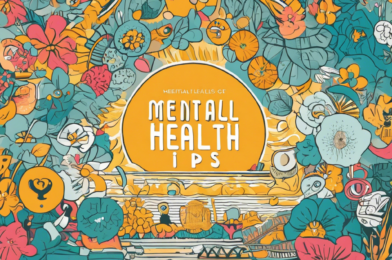It is widely known that nutrition plays a pivotal role in maintaining physical health, but its impact on mental health is equally profound and often underestimated. The connection between what we eat and how we feel is a rapidly growing area of research, revealing that nutrition is a key player in the complex landscape of mental health. Acknowledging this interplay between nutrition and mental health is essential for fostering overall wellbeing. This relationship is bidirectional, meaning that just as our dietary choices can influence our mental health, so too can our mental health influence the dietary decisions we make.
Let’s begin by unpacking the impact of nutrition on our mood and cognitive function. The food we consume serves as the building block for our brain chemistry. A diet rich in anti-inflammatory foods and healthy fats supports the development and function of neurons, positively influencing our mood and cognitive abilities. Omega-3 fatty acids, for instance, are essential for brain health, and a deficiency has been linked to an increased risk of depression, anxiety, and cognitive decline. Incorporating omega-3 rich foods like fatty fish, nuts, and seeds into your diet can provide a natural boost to your mental wellbeing.
Additionally, a healthy gut microbiome is critical for mental health. Our gut is often referred to as our “second brain,” and for good reason. Recent studies have found connections between the gut and the brain through the gut-brain axis, a bidirectional communication pathway. This link suggests that the health of our gut microbiome can influence our mental state, and vice versa. A diverse gut microbiome is associated with improved mood and cognitive function, reduced stress levels, and lower inflammation in the body, all of which contribute to overall mental wellbeing.
An important concept in this field is the notion of ‘nutritional psychiatry,’ which uses dietary interventions as a form of treatment for mental health disorders. This approach focuses on personalized nutrition plans aimed at improving symptoms and addressing underlying nutritional deficiencies that may be contributing to mental health issues. For example, individuals with depression often exhibit lower levels of folic acid and vitamins B and D, highlighting the importance of targeted dietary adjustments to support recovery.
The gut-brain axis also plays a critical role in regulating stress levels and our response to it. High levels of stress can disrupt the balance of gut bacteria and increase intestinal permeability, commonly known as leaky gut syndrome. This can lead to increased inflammation and altered mood and behavior. Probiotics and prebiotics, which support the growth of beneficial bacteria, are often recommended to help manage stress and promote a healthy gut-brain connection.
Another dimension to explore is the impact of nutrition on the development and progression of mental health disorders. Certain dietary patterns, such as the traditional Mediterranean diet, have been linked to a reduced risk of depression and anxiety. This diet is characterized by a high intake of fruits, vegetables, whole grains, lean proteins, and healthy fats, providing abundant nutrients that support mental health. In contrast, a diet high in processed foods and added sugars has been associated with an increased risk of these disorders.
It is also worth noting the influence of nutrition on the treatment and management of existing mental health conditions. Beyond prevention and risk reduction, nutritional strategies can be employed as a complementary treatment approach. For example, individuals with eating disorders often experience a range of psychiatric comorbidities, and addressing nutritional deficiencies is a critical component of their overall treatment plan. Working with a dietitian or nutritionist who specializes in mental health can help individuals navigate the complex relationship between food and their specific mental health concerns.
In conclusion, nutrition is a powerful tool in the toolkit for supporting mental health and treating mental health disorders. The emerging field of nutritional psychiatry offers a promising avenue for prevention, treatment, and overall mental wellbeing. By recognizing the intricate links between what we eat and how we feel, we can make informed dietary choices to nurture our mental health and embrace a more holistic approach to wellbeing. As the field of mental health continues to evolve, so too will our understanding of the critical role that nutrition plays in fostering resilience and supporting recovery.









